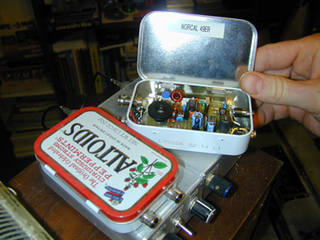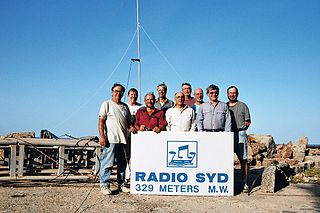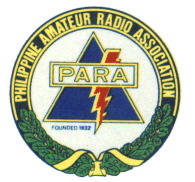
In amateur radio, QRP operation refers to transmitting at reduced power while attempting to maximize one's effective range. QRP operation is a specialized pursuit within the hobby that was first popularized in the early 1920s. QRP operators generally limit their transmitted RF output power to 5 Watts or less regardless of mode be it CW operation or SSB operation.
The American Radio Relay League (ARRL) is the largest membership association of amateur radio enthusiasts in the United States. ARRL is a non-profit organization, and was co-founded on April 6, 1914, by Hiram Percy Maxim and Clarence D. Tuska of Hartford, Connecticut. The ARRL represents the interests of amateur radio operators before federal regulatory bodies, provides technical advice and assistance to amateur radio enthusiasts, supports a number of educational programs and sponsors emergency communications service throughout the country. The ARRL has approximately 161,000 members. In addition to members in the US, the organization claims over 7,000 members in other countries. The ARRL publishes many books and a monthly membership journal called QST.

A DX-pedition is an expedition to what is considered an exotic place by amateur radio operators and DX listeners, typically because of its remoteness, access restrictions, or simply because there are very few radio amateurs active from that place. This could be an island, a country, or even a particular spot on a geographical grid. DX is a telegraphic shorthand for "distance" or "distant".

The International Amateur Radio Union (IARU) is an international confederation of national organisations that allows a forum for common matters of concern to amateur radio operators worldwide, and collectively represents matters to the International Telecommunication Union (ITU). The International Amateur Radio Union was founded in 1925 and, as of July 2021, it is composed of 172 national member societies.

Radio Amateurs of Canada (RAC), known in French as Radio Amateurs du Canada, is the national association for Amateur Radio in Canada. It is a not-for-profit membership association with headquarters in Ottawa, Ontario, Canada, representing the interests of Amateur Radio all across Canada. Speaking on behalf of Canadian Radio Amateurs, RAC provides liaison with government agencies and carries the Amateur voice about regulatory and spectrum issues to the discussion table with government and industry leaders, nationally and internationally.

Field Day is an annual amateur radio exercise, widely sponsored by IARU regions and member organizations, encouraging emergency communications preparedness among amateur radio operators. In the United States, it is typically the largest single emergency preparedness exercise in the country, with over 30,000 operators participating each year. Field Day is always the fourth full weekend of June, beginning at 18:00 UTC Saturday and running through 20:59 UTC Sunday.

A Hamfest is a convention of amateur radio enthusiasts, often combining a trade show, flea market, and various other activities of interest to amateur radio operators (hams). In the United Kingdom the term rally is more commonly used for amateur radio conventions. "Hamfests" were noted as early as 1924 in the U.S.
DXing is the hobby of receiving and identifying distant radio or television signals, or making two-way radio contact with distant stations in amateur radio, citizens' band radio or other two-way radio communications. Many DXers also attempt to obtain written verifications of reception or contact, sometimes referred to as "QSLs" or "veries". The name of the hobby comes from DX, telegraphic shorthand for "distance" or "distant".

Contesting is a competitive activity pursued by amateur radio operators. In a contest, an amateur radio station, which may be operated by an individual or a team, seeks to contact as many other amateur radio stations as possible in a given period of time and exchange information. Rules for each competition define the amateur radio bands, the mode of communication that may be used, and the kind of information that must be exchanged. The contacts made during the contest contribute to a score by which stations are ranked. Contest sponsors publish the results in magazines and on web sites.
Like most other sports, amateur radio contesting has its share of disputes and controversy. These disputes are long-standing and may see no thorough resolution for a long time. They are presented for their informational value, with the positions in dispute summarized. There are several online forums where these topics are discussed.

In times of crisis and natural disasters, amateur radio is often used as a means of emergency communication when wireline, cell phones and other conventional means of communications fail.
The New Zealand Association of Radio Transmitters (NZART) is a non-profit organisation of amateur radio enthusiasts in New Zealand. It represents New Zealand amateur radio operators nationally and internationally. NZART is a founding member of the International Amateur Radio Union. It is an association of individual members, however those members are encouraged to form local branches.

Frazier Othel Thompson III, better known by his stage name Trae tha Truth, is an American rapper and record executive from Houston, Texas. Embarking on a musical career in 1998, he soon established himself as a prominent member of the Texas hip hop scene with his solo debut, Losing Composure (2003). Same Thing Different Day (2004) and Restless (2006) followed up, the latter of which was his debut on Rap-a-Lot Records.

Vintage amateur radio is a subset of amateur radio hobby where enthusiasts collect, restore, preserve, build, and operate amateur radio equipment from bygone years, such as those using vacuum tube technology. Popular modes of operation include speaking over amplitude modulation (AM), and communicating using Morse code through continuous wave (CW) radiotelegraphy. Some enthusiasts have interest in owning, restoring and operating vintage military and commercial radio equipment such as those from 1940s to 1960s. Some undertake to construct their own gear, known in ham slang as homebrewing, using vintage parts and designs. A number of amateur radio clubs and organizations sponsor contests, events, and swap meets that cater to this specialized aspect of the hobby.
The First Class CW Operators' Club is a club for amateur radio operators who regularly make use of Morse code.
Amateur radio or ham radio is practised by more than 22,000 licensed users in India. The first amateur radio operator was licensed in 1921, and by the mid-1930s, there were around 20 amateur radio operators in India. Amateur radio operators played an important part in the Indian independence movement with the establishment of illegal pro-independence radio stations in the 1940s. The three decades after India's independence saw only slow growth in the number of operators until the then Prime Minister of India and amateur radio operator, Rajiv Gandhi (VU2RG), waived the import duty on wireless equipment in 1984. Since then, numbers have picked up, and as of 2007, there were more than 16,000 operators in the country. Amateur radio operators have played a vital role during disasters and national emergencies such as earthquakes, tsunamis, cyclones, floods, and bomb blasts, by providing voluntary emergency communications in the affected areas.

The Philippine Amateur Radio Association (PARA) is a national non-profit organization for amateur radio enthusiasts in the Philippines. Key membership benefits of PARA include the sponsorship of amateur radio operating awards and radio contests, and a QSL bureau for those members who regularly communicate with amateur radio operators in other countries. PARA represents the interests of Filipino Amateur Radio Operators/Enthusiasts before the national and international telecommunications regulatory authorities. PARA is the national member society representing the Philippines in the International Amateur Radio Union.
The Cambridge University Wireless Society (CUWS) is the amateur radio club of the University of Cambridge, England.
Call signs in Asia are rarely used to identify broadcast stations. In most Asian countries, broadcast stations use other forms of identification. Japan, South Korea, Indonesia, the Philippines and Taiwan are exceptions to this rule. Amateur radio stations in India, Pakistan, Korea and Japan are allocated call-signs.









